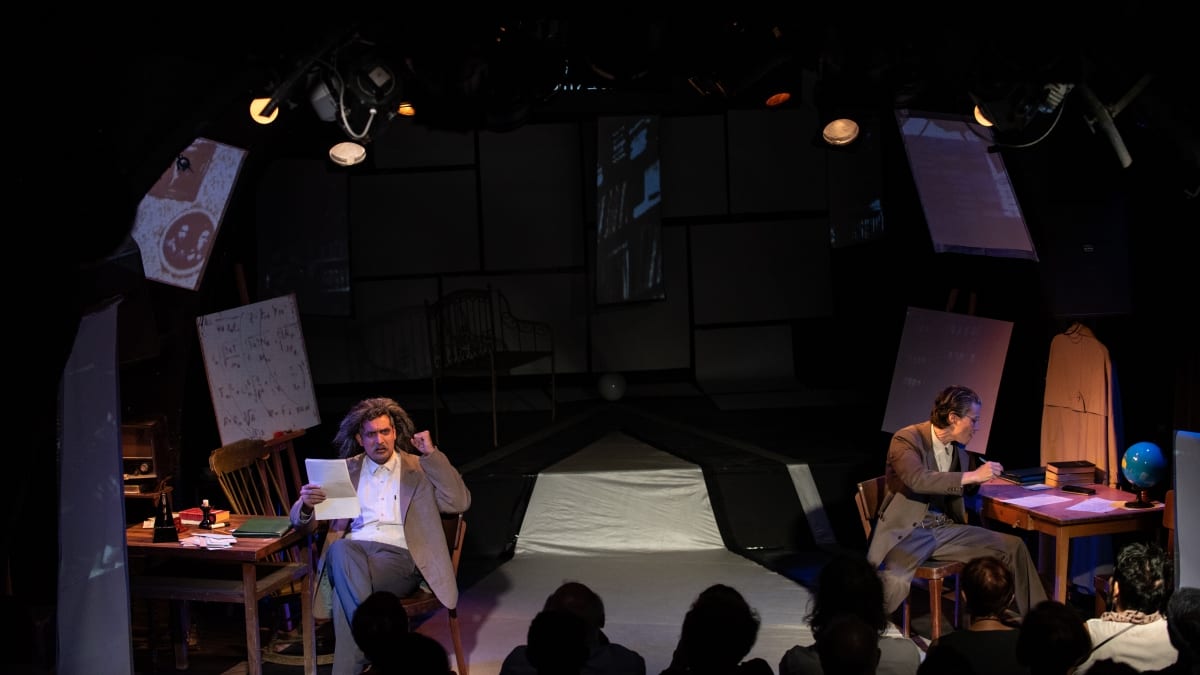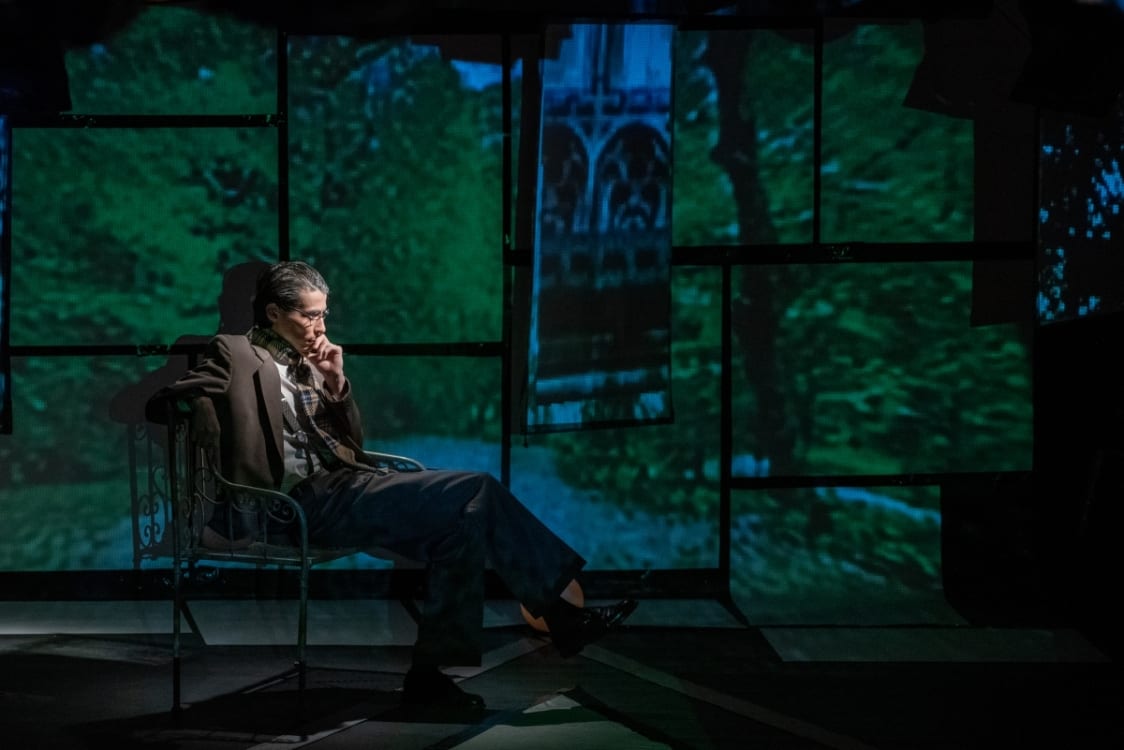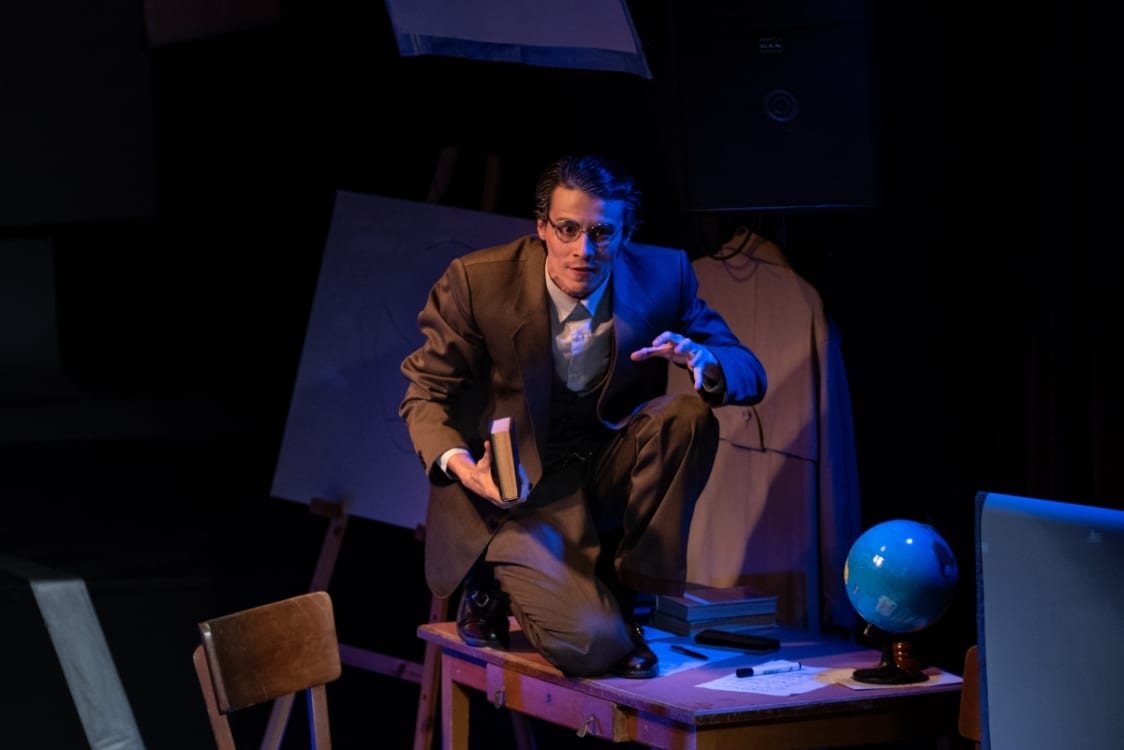My next observation is nothing more than my opinion, on the one hand, although backed up by deep observation on the other. As a millennial myself, I will assert that my generation prefers a certain kind of art, what I would venture to call “relatable art”. We mainly want to connect with, and therefore support the most realistic, satisfying, down-to-earth creations; all books and shows that bring us ourselves, as if in a mirror. We want to see on the stage or screen: our frustrations, relationships; Y-generation-existential-angst; our search of meaning, acknowledgement and the lack of finding these things.
Frankly, I got sick of so much that I was sitting through. What about technique, I wondered; what about art that’ll improve me, not only touch my heart. Yes, art should be relatable – but also – it should be something other, something more. The very thing that I’ve found in “Worlds in Collision” by Iddo Netanyahu is what I have been looking for. You may call it novelty or the courage to challenge audiences; or the thing that defines art as better than people. “Worlds in Collision” isn’t all simple, its rhythm is breath-taking, you’ll have to concentrate – especially if you know nothing about physics. It is sophisticated. It’s even weird. A work of art, literally. A must-see.

“Worlds in Collision” enters into the minds of two geniuses, but also into their (and our) biggest fear: the terror of rejection. It tells the story of Immanuel Velikovsky (played by Obid Adurakhmanov), a psychoanalyst who lived between 1895 and 1979 and was interested in a lot of fields. He used his knowledge to write an extremely unconventional book, “Worlds in Collision”, where he tries to explain, well, everything. Using theories from Astronomy, History and more, he creates a new map of explanations to cosmic facts. It was a best-seller, among ordinary readers; but a joke among academics.
Velikovsky got excluded from intellectual society. He created a huge stir among scientists of the time, one of whom was Albert Einstein (played by Khasan Salikhov), the founder of the modern physics and a Nobel Prize winner. He scorns Velikovsky, laughs at him. But Einstein also spends this time of his life trying to discover the grand “master key” to the universe. His glory is no longer what it used to be. He feels alone. Einstein slowly becomes friends with Velikovsky, since both of them are lonely in their individual genius and abilities. And what happens next, I’ll leave you to see. This is a thought-provoking play that you should see.
The actors are excellent – charismatic, passionate. They truly inhabit their characters. Thanks to them, you can even understand the complicated text. They communicate with us directly all through the play, without a fourth wall; they need our eyes, our assurance, our attention. The screens on stage change frequently and create quite a trippy atmosphere as if it is all a metaphysical conversation happening in some other space. That creates the tension of every minute – an endless movement. Their dialogues keep spiralling, even though this approach becomes, it seemed to me, somewhat exhausting at certain moments. I think it’s mainly because there was no break or interval in the middle. Also, I believe the ending should have been shorter and more focused, as the dramatic ending of a classical tune. And yet, the play is an experience I would not have you miss.
Art shouldn’t be only a mirror, but also a promise. It should include me and my thoughts, and an extra something that will lift me toward it. And that is what Netanyahu certainly manages to do, even though, the secret of the universe that the play is urging to find remains a mystery.
עולמות מתנגשים
.כולם צורכים אומנות, באינספור אופנים וצורות. אנו זקוקים לה, רווים ממנה; בלי מוזיקה נאבד את הצפון, אין אדם שלא נהנה מיופי. והנה ממש לאחרונה תהיתי מתי אשתאה לא רק מיכולת האומנות לשקף לי אותי ואת מאוויי. מתי לא אראה יצירה מעוררת הזדהות, אלא השתאות. תהיה בה שפה מתפתלת, מצריכת-מאמץ, ממאנת להתבהר; וביצוע מבריק, אלוהי. מתי אמתח את צווארי, כדי להתאמץ ולתפוס משהו גדול ממני
.דומה התחושה לזו שנמצאת בגוף של מי שסגר את כרך ב’ של “אנה קארנינה”, אחרי שסיים לקרוא, וכעת הוא בוהה בקיר ובולע רוק כמו טמבל. מה עכ שואל. אמנם טולסטוי מתיש בנאומי הסוציאליזם העבשים של לוין, כלומר יש לה ליצירה פגם; אבל טיבה מקסימלי, היא נשגבה. קראתי משהו נשגב. הסופר למד את עצמו ואת זולתו אל תוך-תוככי נפשם. אומנות דגולה, מהממת, היכן את? ואז צפיתי ב’עולמות מתנגשים
.עידו נתניהו ונבי אבדורקחמנוב היו נועזים כלפי הטקסט, הבמה והמיזנסצנה. עם תחילת המופע, נכנסו שני השחקנים, בתור עצמם, ותוך כדי ההסבר עטו את הדמויות של וליקובסקי ואיינשטיין. המהלך זרם מכוח עצמו, בטבעיות, כאילו המרחב הבימתי הודה שהוא-הוא, ובכל זאת נותר אמין. בלי לגרוע עין ממבטנו, הפכה הצגה להיות עצמה

.איינשטיין ווליקובסקי נפגשו, לא הסתדרו, נפגשו שוב ונסחפו משם למחול חרבות אינטלקטואלי, פיזיקלי ופילוסופי, של חיפוש אחר האמת, אחר ההכרה והתהילה, בפחד האקוטי מהבדידות שבגאונות, נחלת שניהם. לאור הפולומוס שנעור ביניהם וכל יתר ההתרחשויות, ריצדו מסכי-הרקע שבבמה, רעם הסאונד. הדרמה הייתה פנימית, רעיונית. השחקנים הסבירו אחת לכמה ז את מהלכיהם, ממשיכים לשכוח מהקיר הרביעי, אפילו רצים ביננו בלהט-דיון; כך הצליחה הצגה שאינה אלא דיאלוג מדעי, להפוך במה לאטמוספרה רוויה עד להתפוצץ. האנרגיה הלכה, .נמתחה. שאלת האמת של העולם, כאב הנידוי של וליקובסקי, כל אלו רעדו בעצמות הקהל
.הסיפור האמיתי הותיר אותנו מלאי צימאון. כלומר כשנפתח האור, אני וחברי החלפנו מבט המום. גם זהו תפקידה של יצירה, לא רק לעודדנו שאיננו לבד, ודומים, אלא גם לחיות את גופנו בכיסופי אושר, בהתנשמות שבאה מהרגשה, שאיזה דבר הוא העולם. אמנם מה שקרה לוליקובסקי זו טרגדיה, כפי שתיווכחו אבל הגאונות ופריצת-הדרך מעניקים מקום להתאהב בדברים. מאוד ממליצה

